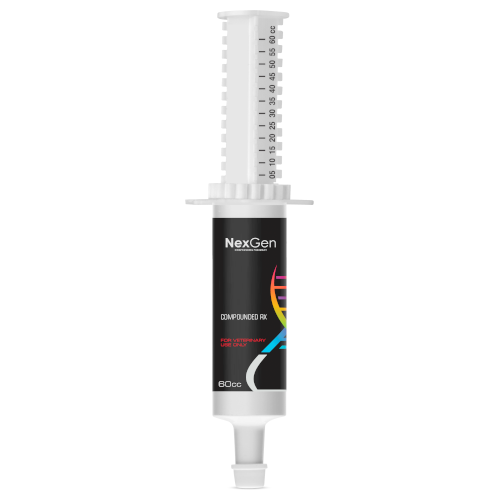
Enrofloxacin 100 mg/mL, Paste, (60mL)
Login for pricing
- Brand
- Mixlab
- SKU:
- NC-0222
- Product Type:
- Paste
- Size:
- 60ml
- Administration:
- Oral
There are numerous bacterial infections that affect horses. While some are more common than others, horses can be affected by bacterial pathogens that infect their blood, lungs, intestines, reproductive systems, urinary tract, mammary glands, skin, muscles or joints. In the area of preventing bacterial disease in their horses, many horse owners are of the belief that vaccination and deworming programs are sufficient.1 Unfortunately, this is not the case. The immunization of horses with vaccines to prevent or reduce the severity of infectious diseases is a very important part of any infection control plan however, it is important for horse owners to realize that vaccination is only one part of a complete infection control plan.1,2 Very few vaccines protect with 100% efficacy, and there are diseases of the horse for which there are no licensed vaccines.
Common bacterial diseases affecting horses include:
Strangles is a highly contagious disease of the equine upper respiratory tract caused by the bacterium Streptococcus equi. This disease is contracted via environmental contamination, nasal discharge, or direct contact with infected animals.
Tetanus is caused by the bacteria Clostridium tetani. These bacteria usually enter the horse’s body through wounds from the environment or, occasionally from surgical procedures. Affected horses can suffer from spasms, high fever, violent reactions to sudden movement or noise and even death from asphyxiation. Tetanus is almost always fatal.
Botulism. While exceedingly rare in horses, botulism is almost always fatal. Caused by the toxins produced by the Clostridium botulinum bacteria, this disease paralyzes the peripheral nervous system by preventing transmission of the nervous impulses. The C. botulinum bacteria are found in soil and in decaying matter.
Endotoxemia, as the name suggests, is caused by the presence of endotoxins in a horse’s blood resulting from certain types of bacteria in the gut that have breached the gut wall and entered the bloodstream. If not treated promptly, endotoxemia can lead to shock, laminitis, and death.2 Endotoxemia is seen both in adult horses and in newborn foals.
Potomac Horse Fever is caused by the parasite Neorickettsia risticii and is characterized by fever, laminitis, edema, severe diarrhea and occasionally, death. Horses are infected by insects that carry the parasite. It is not contagious and occurs more commonly in wet areas.
Intestinal Bacterial Infections. There are many types of intestinal bacterial infections that can infect horses. The most common infectious cause of diarrhea in horses is salmonella, which is the result of an infection of the horse’s intestinal tract by a bacterial pathogen of the same name.2
Enrofloxacin for Bacterial Infections in the Horse
Enrofloxacin is effective against a variety of pathogens, although it is not effective against anaerobes. The literature holds that its use should be avoided in young, growing animals because of the potential negative impact on cartilage development.
Where to buy Enrofloxacin
Enrofloxacin is available in the U.S. through several pharmaceutical manufacturers and through veterinary custom compounding companies.
Enrofloxacin carries numerous potential drug interactions. Please consult your veterinarian prior to beginning any treatment regimen.
FOR RX ONLY: A valid prescription from a licensed veterinarian is required for dispensing this medication.
1aaep.org.
2Panchaud, Y., et. al. Bacterial infections in horses: a retrospective study at the University Equine Clinic of Bern. Schweiz Arch Tierheilkd. 2010 Apr;152(4):176-82. doi: 10.1024/0036-7281/a000040. PMID: 20361396.
3Davis, J. What's New in Antibiotics, Antifungals, and Antivirals for Horses. Proceedings: NAVC Conference 2013 Large Animal.
4Plumb’s Veterinary Drugs.









